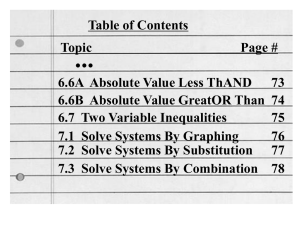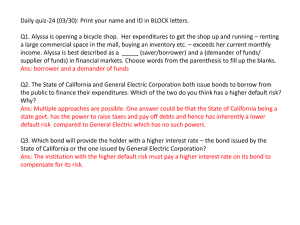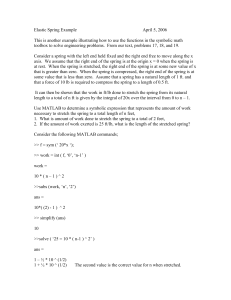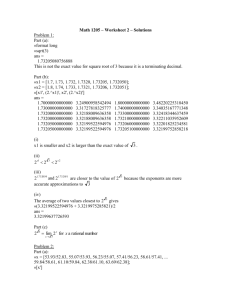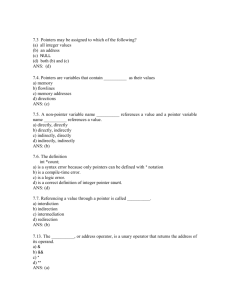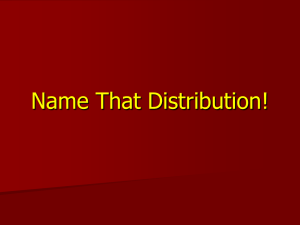Use the following to answer questions 1-12:
advertisement
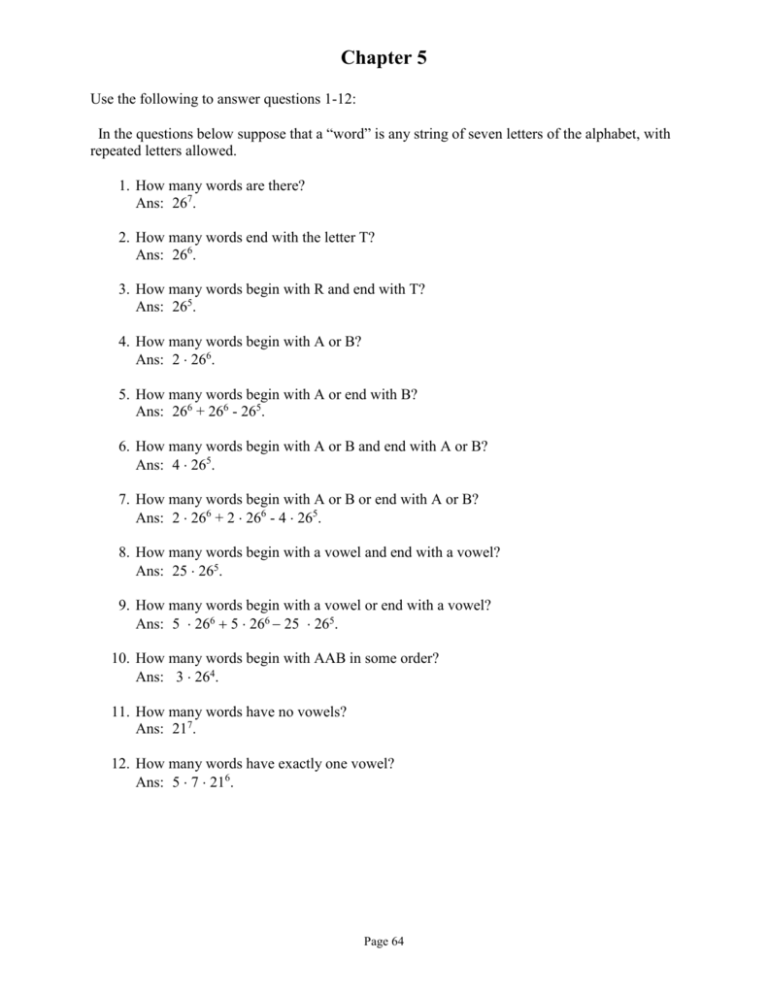
Chapter 5 Use the following to answer questions 1-12: In the questions below suppose that a “word” is any string of seven letters of the alphabet, with repeated letters allowed. 1. How many words are there? Ans: 267. 2. How many words end with the letter T? Ans: 266. 3. How many words begin with R and end with T? Ans: 265. 4. How many words begin with A or B? Ans: 2 266. 5. How many words begin with A or end with B? Ans: 266 + 266 - 265. 6. How many words begin with A or B and end with A or B? Ans: 4 265. 7. How many words begin with A or B or end with A or B? Ans: 2 266 + 2 266 - 4 265. 8. How many words begin with a vowel and end with a vowel? Ans: 25 9. How many words begin with a vowel or end with a vowel? Ans: 5 10. How many words begin with AAB in some order? Ans: 3 11. How many words have no vowels? Ans: 217. 12. How many words have exactly one vowel? Ans: 5 7 216. Page 64 13. Find the number of words of length eight of distinct letters of the alphabet so that the words do not have both A and B in them. Ans: First count the number of words that contain both A and B. This number is 8 7 P(246). Therefore the answer is equal to total number of words of length eight minus the number of words of length eight that have both A and B: P(268) 8 7 P(246). Use the following to answer questions 14-18: In the questions below consider all bit strings of length 12. 14. How many begin with 110? Ans: 29. 15. How many begin with 11 and end with 10? Ans: 28. 16. How many begin with 11 or end with 10? Ans: 2 210 28. 17. How many have exactly four 1s? Ans: 12 4 . 18. How many have exactly four 1s and none of these 1s are adjacent to each other? Ans: 9 4 . 19. How many permutations of the seven letters ABCDEFG are there? Ans: 7. 20. How many permutations of the seven letters ABCDEFG have E in the first position? Ans: 6. 21. How many permutations of the seven letters ABCDEFG have E in one of the first two positions? Ans: 2 6. 22. How many permutations of the seven letters ABCDEFG do not have vowels on the ends? Ans: 5 4 5. Page 65 23. How many permutations of the seven letters ABCDEFG have the two vowels before the five consonants? Ans: 2 5. 24. How many permutations of the seven letters ABCDEFG have A immediately to the left of E? Ans: 6. 25. How many permutations of the seven letters ABCDEFG neither begin nor end with A? Ans: 5 6. 26. How many permutations of the seven letters ABCDEFG do not have the vowels next to each other? Ans: 7 2 6. Use the following to answer questions 27-33: In the questions below nine people (Ann, Ben, Cal, Dot, Ed, Fran, Gail, Hal, and Ida) are in a room. Five of them stand in a row for a picture. 27. In how many ways can this be done if Ben is to be in the picture? Ans: 5P(84). 28. In how many ways can this be done if both Ed and Gail are in the picture? Ans: 5 4 P(73). 29. In how many ways can this be done if neither Ed nor Fran are in the picture? Ans: P(75). 30. In how many ways can this be done if Dot is on the left end and Ed is on the right end? Ans: P(73). 31. In how many ways can this be done if Hal or Ida (but not both) are in the picture? Ans: 2 5 P(74). 32. In how many ways can this be done if Ed and Gail are in the picture, standing next to each other? Ans: 2 4 P(73). 33. In how many ways can this be done if Ann and Ben are in the picture, but not standing next to each other? Ans: 5 4 P(73) 2 4 P(73). Page 66 34. In a technician's box there are 400 VLSI chips, 12 of which are faulty. How many ways are there to pick two chips, so that one is a working chip and the other is faulty? Ans: 388 12. 35. How many truth tables are possible for compound propositions with the five variables pqrst? .1in 5 Ans: 22 . Use the following to answer questions 36-40: In the questions below let A be the set of all bit strings of length 10. 36. How many bit strings of length 10 are there? Ans: 210. 37. How many bit strings of length 10 begin with 1101? Ans: 26. 38. How many bit strings of length 10 have exactly six 0s? Ans: 10 6 . 39. How many bit strings of length 10 have equal numbers of 0s and 1s? Ans: 10 5 . 40. How many bit strings of length 10 have more 0s than 1s? Ans: 10 6 10 7 10 10 10 5 210 2 . Use the following to answer questions 41-44: In the questions below suppose you have 30 books (15 novels, 10 history books, and 5 math books). Assume that all 30 books are different. In how many ways can you 41. In how many ways can you put the 30 books in a row on a shelf? Ans: 30. 42. In how many ways can you get a bunch of four books to give to a friend? Ans: 30 4 . Page 67 43. In how many ways can you get a bunch of three history books and seven novels to give to a friend? Ans: 10 15 3 7 . 44. In how many ways can you put the 30 books in a row on a shelf if the novels are on the left, the math books are in the middle, and the history books are on the right? Ans: 15 5 10. 45. A class consists of 20 sophomores and 15 freshmen. The class needs to form a committee of size five. (a) How many committees are possible? (b) How many committees are possible if the committee must have three sophomores and two freshmen? Ans: (a) 35 5 . (b) 20 15 3 2 . Use the following to answer questions 46-49: In the questions below a club with 20 women and 17 men needs to form a committee of size six. 46. How many committees are possible? Ans: 37 6 . 47. How many committees are possible if the committee must have three women and three men? Ans: 20 17 3 3 . 48. How many committees are possible if the committee must have at least two men? Ans: 17 20 2 4 173 203 174 202 175 201 176 200 . 49. How many committees are possible if the committee must consist of all women or all men? Ans: 20 6 176 . Page 68 50. A club with 20 women and 17 men needs to choose three different members to be president, vice president, and treasurer. (a) In how many ways is this possible? (b) In how many ways is this possible if women will be chosen as president and vice president and a man as treasurer? Ans: (a) 37 36 35. (b) 20 19 17. 51. A class consists of 20 sophomores and 15 freshmen. The club needs to choose four different members to be president, vice president, secretary, and treasurer. (a) In how many ways is this possible? (b) In how many ways is this possible if sophomores will be chosen as president and treasurer and freshmen as vice president and secretary? Ans: (a) 35 34 33 32. (b) 20 19 15 14. 52. Suppose A 4 and B 10. Find the number of functions f A B. Ans: 104. 53. Suppose A 4 and B 10. Find the number of 1-1 functions f A B. Ans: P(104). 54. Suppose A 10 and B 4. Find the number of 1-1 functions f A B. Ans: 0. Use the following to answer questions 55-58: In the questions below let A be the set of all strings of decimal digits of length five. For example 00312 and 19483 are strings in A. 55. Find A . Ans: 105. 56. How many strings in A begin with 774? Ans: 102. 57. How many strings in A have exactly one 5? Ans: 5 94. 58. How many strings in A have exactly three 5s? Ans: 5 3 92 . 59. Make up a word problem in good English whose answer is 1510. Ans: In how many ways can 5 out of 15 people be put in a row for a picture? Page 69 60. Make up a word problem in good English whose answer is 15 4 73 . Ans: A class has 15 women and 7 men. In how many ways can a committee of 4 women and 3 men be formed? 61. How many subsets with an odd number of elements does a set with 10 elements have? Ans: C(101) C(103) C(105) C(107) C(109). 62. How many subsets with more than two elements does a set with 100 elements have? Ans: 2100 C(1000) C(1001) C(1002). 63. Each user has a password 6 characters long where each character is an uppercase letter, a lowercase letter, or a digit. Each password must contain at least one digit. How long will it take to check every possible character combination, if each check takes one unit of time. Ans: (26 26 10)6 (26 26)6 units of time. Use the following to answer questions 64-67: In the questions below suppose you have a class with 30 students — 10 freshmen, 12 sophomores, and 8 juniors. 64. In how many ways can you put all 30 in a line? Ans: 30. 65. In how many ways can you put all students in a line so that the freshmen are first, the sophomores are in the middle, and the juniors are at the end? Ans: 10 12 8. 66. In how many ways can you get a committee of 7? Ans: 30 7 . 67. In how many ways can you get a committee of 4 freshmen and 3 sophomores? Ans: 10 12 4 3 . 68. Using the ordinary alphabet and allowing repeated letters, find the number of words of length 8. Ans: 268. 69. Using the ordinary alphabet and allowing repeated letters, find the number of words of length 8 that begin and end with T. Ans: 266. Page 70 70. Using the ordinary alphabet and allowing repeated letters, find the number of words of length 8 that begin and end with the same letter. Ans: 26 266. 71. Using the ordinary alphabet and allowing repeated letters, find the number of words of length 8 that have exactly one B. Ans: 8 257. 72. Using the ordinary alphabet and allowing repeated letters, find the number of words of length 8 that have at least one C. Ans: 268 258. 73. Using the ordinary alphabet and allowing repeated letters, find the number of words of length 8 that begin with L or end with R. Ans: 267 267 266. 74. How many ways are there to select 6 students from a class of 25 to serve on a committee? Ans: C(256). 75. How many ways are there to select 6 students from a class of 25 to hold six different executive positions on a committee? Ans: P(256). 76. Find the number of subsets of S 123…10 that contain the number 5. Ans: 29. 77. Find the number of subsets of S 123…10 that contain neither 5 nor 6. Ans: 28. 78. Find the number of subsets of S 123…10 that contain both 5 and 6. Ans: 28. 79. Find the number of subsets of S 123…10 that contain no odd numbers. Ans: 25. 80. Find the number of subsets of S 123…10 that contain exactly three elements. Ans: C(103). 81. Find the number of subsets of S 123…10 that contain exactly three elements, one of which is 3. Ans: C(92). Page 71 82. Find the number of subsets of S 123…10 that contain exactly five elements, all of them even. Ans: 1. 83. Find the number of subsets of S 123…10 that contain exactly three elements, all of them even. Ans: C(53). 84. Find the number of subsets of S 123…10 that contain exactly five elements, two of which are 3 and 4. Ans: C(83). 85. Find the number of subsets of S 123…10 that contain exactly five elements, including 3 or 4 but not both. Ans: 2C(84). 86. Find the number of subsets of S 123…10 that contain exactly five elements, but neither 3 nor 4. Ans: C(85). 87. Find the number of subsets of S 123…10 that contain exactly five elements, the sum of which is even. Ans: C(51)C(54) C(53)C(52) 1. 88. Find the number of subsets of S 123…10 that contain exactly four elements, the sum of which is odd. Ans: 2C(53)C(51). 89. Find the number of subsets of S 123…10 that contain exactly four elements, the sum of which is even. Ans: 2C(54) C(52)2. 90. Suppose a restaurant serves a “special dinner” consisting of soup, salad, entree, dessert, and beverage. The restaurant has five kinds of soup, three kinds of salad, ten entrees, five desserts, and four beverages. How many different special dinners are possible? (Two special dinners are different if they differ in at least one selection.) Ans: 5 3 10 5 4. Page 72 91. The figure shows a 4-block by 5-block grid of streets. Find the number of ways in which you can go from point A to point B, where at each stage you can only go right or up. (You are not allowed to go left or down.) For example, one allowable route from A to B is: Right, Right, Up, Right, Up, Up, Right, Right, Up. Ans: C(95). 92. Here is an incorrect solution to a problem. Find the error, explain why it is not correct, and give the correct answer. “Problem: Find the number of ways to get two pairs of two different ranks (such as 2 jacks and 2 fives) in a 4-card hand from an ordinary deck of 52 cards.” “Solution: There are 13 ways to get a rank (such as “kings”) for the first pair and 4 2 ways to get a pair of that rank. Similarly, there are 12 ways to get a rank (such as “sevens”) for the second pair and 4 2 ways to get a pair of that rank. Therefore there are 13 42 12 42 ways to get 2 pairs.” Ans: The same hand is counted twice. (Getting a pair of kings first and a pair of sevens second is the same as getting a pair of sevens first and a pair of kings second.) To obtain the correct answer, divide the given answer by two. Page 73 93. A game consisting of flipping a coin ends when the player gets two heads in a row, two tails in a row, or flips the coin four times. (a) Draw a tree diagram to show the ways in which the game can end. (b) In how many ways can the game end? Ans: (b) 8. 94. A factory makes automobile parts. Each part has a code consisting of a letter and three digits, such as C117, O076, or Z920. Last week the factory made 60,000 parts. Prove that there are at least three parts that have the same serial number. Ans: The number of codes is 26 103 26000. Since 6000026000 3, at least three parts have the same code number. Page 74 95. A factory makes automobile parts. Each part has a code consisting of a digit, a letter, and a digit, with the digits distinct, such as 5C7, 1O6, or 3Z0. Last week the factory made 5,000 parts. Find the minimum number of parts that must have the same serial number. Ans: The number of codes is 10 26 9 2340. Since 60002340 3, at least three parts have the same code number. 96. Show that if five points are picked on or in the interior of a square of side length 2, then there are at least two of these points no farther than 2 apart. Ans: Divide the square into four congruent 1 1 squares. At least two of the five points lie in or on the edge of one of these 1 1 squares. The maximum distance between these two points is 2 . 97. A professor teaching a Discrete Math course gives a multiple choice quiz that has ten questions, each with four possible responses: a, b, c, d. What is the minimum number of students that must be in the professor's class in order to guarantee that at least three answer sheets must be identical? (Assume that no answers are left blank.) Ans: There are 410 possible answer sheets. Therefore 2 410 1 is the minimum number that will guarantee three identical answer sheets. 98. Show that in a group of ten people (where any two people are either friends or enemies) there are either three mutual friends or four mutual enemies. Ans: Let A be one of the people. A either has at least four friends or else has at least six enemies among the other nine people. Case 1: A has at least four friends, say BCDE. If any two of BCDE are friends, then these two together with A form a group of three mutual friends. If none of BCDE are friends with each other, then BCDE are four mutual enemies. Case 2: A has at least six enemies, say BCDEFG. Applying the Pigeonhole Principle to this set of six, there are either three mutual friends or three mutual enemies. If there are three friends, we are done. If there are three mutual enemies, then these three together with A form a group of four mutual enemies. 99. A computer network consists of six computers. Each computer is directly connected to zero or more of the other computers. Show that there are at least two computers in the network that are directly connected to the same number of computers. Ans: Each computer can be connected to 01234, or 5 other computers, but it is not possible in the network to have a computer connected to 0 others and a computer connected to all 5 others. Therefore there are only five possible connection numbers, which is smaller than the number of computers. By the Pigeonhole Principle at least two must have the same number of connections. 100. A computer is programmed to print subsets of 12345 at random. If the computer prints 40 subsets, prove that some subset must have been printed at least twice. Ans: There are 25 32 subsets. If 33 or more subsets are printed, at least one will have been printed twice. Page 75 101. A computer randomly prints three-digit codes, with no repeated digits in any code (for example, 387, 072, 760). What is the minimum number of codes that must be printed in order to guarantee that at least six of the codes are identical? Ans: There are 10 9 8 720 different codes. Therefore 5 720 1 3601 is the minimum number of printed codes that guarantees that at least six identical codes will be printed. 102. Explain how the Pigeonhole Principle can be used to show that among any 11 integers, at least two must have the same last digit. Ans: Use the eleven integers as the pigeons and the ten possible last digits are the pigeonholes. 103. Let s1s2…s101 be 101 bit strings of length at most 9. Prove that there exist two strings, si and sj, where i j, that contain the same number of 0s and the same number of 1s. (For example, strings 001001 and 101000 contain the same number of 0s and the same number of 1s.) Ans: There are ten possible lengths a bit string can have — 012…9. Since there are 101 bit strings, there is a length number k such that at least 11 bit strings have length k. The number of 0s in these 11 bit strings must be one of the ten numbers 012…9. Therefore, there are at least two bit strings si and sj, with the same number of 0s. Since si and sj have the same length, k, they both have the same number of 1s. 104. You pick cards one at a time without replacement from an ordinary deck of 52 playing cards. What is the minimum number of cards you must pick in order to guarantee that you get (a) a pair (for example, two kings or two 5s). (b) three of a kind (for example, three 7s). Ans: (a) 14. (b) 27. 105. Use the binomial theorem to expand (2a b)4. Ans: 16a4 32a3b 24a2b2 8ab3 b4. 106. Use the binomial theorem to expand (x y)5. Ans: x5 5x4y 10x3y2 10x2y3 5xy4 y5. 107. Use the binomial theorem to expand (a 2)6. Ans: a6 12a5 60a4 160a3 240a2 192a 64. 108. Use the binomial theorem to expand (2c 3d)4. Ans: 16c4 96c3d 216c2d2 216cd3 81d4. 109. Use the binomial theorem to expand x 3x . 5 Ans: x5 15x3 90x 270x 405x3 243x5. Page 76 110. Use the binomial theorem to expand x 2 1x . 7 Ans: x14 7x11 21x8 35x5 35x2 21x 7x4 1x7. 6 6 6 111. Use the binomial theorem to prove the following: 26 . 0 1 6 n Ans: In (a b) use n 6, a b 1. 112. Use the binomial theorem to prove the following: 100 100 100 100 100 100 100 100 100 100 100 0 2 4 6 98 100 1 3 5 97 99 . n Ans: In (a b) use n 100, a 1, b 1. 113. Use the binomial theorem to prove the following: 100 100 100 2 100 3 100 99 100 100 3100 2 2 2 2 2 . 0 1 2 3 99 100 Ans: In (a b)n use n 100, a 1, b 2. 114. Find the coefficient of x7y5 in the expansion of (3x y)12. Ans: 127 37 . 115. Find the coefficient of x5y6 in the expansion of (2x y)11. Ans: 11 5 25 116. Find the coefficient of x8 in the expansion of (x2 2)13. Ans: 13 9 29 . 117. Find the coefficient of x9 in the expansion of (2 x3)10. Ans: 10 3 27 . 118. Find the coefficient of x5 in (2 x2)12. Ans: 0. 119. Find the number of terms in the expansion of (5a 8b)15. Ans: 16. Page 77 120. Find the largest coefficient in the expansion of (x 1)6. Ans: 20. 121. Find the largest coefficient in the expansion of (x 3)5. Ans: 405. 122. List the derangements of 1234. Ans: 2143, 2341, 2413, 3142, 3412, 3421, 4123, 4312, 4321. 123. Find the number of positive integers not exceeding 1000 that are not divisible by.4, 6, or 9. Ans: 611. 124. How many permutations of 12345 are there that leave 3 in the third position but leave no other integer in its own position? Ans: 9. 125. (a) Find the number of solutions to x y z 32, where x, y, and z are nonnegative integers. (b) Answer part (a), but assume that x 7 and y 15. Ans: (a) 34 2 . (b) 12 2 . 126. You have 20 pennies, 30 nickels, and 40 dimes. Assume that the pennies are identical, the nickels are identical, and the dimes are identical. In how many ways can you put all the coins in a row? Ans: 2090 3040 . 127. Find the number of permutations of the word CORRECT. Ans: (a) 272 . 128. Find the number of permutations of the word COEFFICIENT. Ans: (211)4 . 129. Find the number of permutations of the word TATTERED. Ans: 382 . 130. Find the number of permutations of your last name. Ans: Depends on last name. 131. How many different strings can be made using all the letters in the word GOOGOL? Ans: 3621 . Page 78 132. (a) In how many ways are there to arrange the letters of the word NONSENSE? (b) How many of these ways start or end with the letter O? Ans: (a) 32821 . (b) 32272 . 133. A doughnut shop sells 30 kinds of doughnuts. In how many ways can you (a) get a bag of 12 doughnuts? (b) get a bag of 12 doughnuts if you want at least 3 glazed doughnuts and at least 4 raspberry doughnuts? (c) get a bag of 12 doughnuts if you want exactly 3 glazed doughnuts and exactly 4 raspberry doughnuts? Ans: (a) 41 29 . (b) 34 29 . (c) 32 27 . 134. You have 50 of each of the following kinds of jellybeans: red, orange, green, yellow. The jellybeans of each color are identical. (a) In how many ways can you put all the jellybeans in a row? (b) How many handfuls of 12 are possible? Ans: (a) 200 504 . (b) 15 3 . Use the following to answer questions 135-138: In the questions below assume that you have 50 pennies and three jars, labeled A, B, and C. 135. In how many ways can you put the pennies in the jars, assuming that the pennies are distinguishable? Ans: 350. 136. In how many ways can you put the pennies in the jars, assuming that the pennies are identical? Ans: 52 2 . 137. In how many ways can you put the pennies in the jars, assuming that the pennies are identical and each jar must have at least two pennies put into it? Ans: 46 2 . 138. In how many ways can you put the pennies in the jars, assuming that the pennies are identical and each jar must have an even number of pennies put into it? Ans: 27 2 . Page 79 Use the following to answer questions 139-142: In the questions below assume that you have a bowl containing hard candies: 50 cherry, 50 strawberry, 40 orange, 70 lemon, and 40 pineapple. Assuming that the pieces of each flavor are identical, 139. How many handfuls of 15 are possible? Ans: 19 4 . 140. How many handfuls of 15 are possible with at least one piece of each flavor? Ans: 14 4 . 141. How many handfuls of 15 are possible with at least two pieces of each flavor? Ans: 9 4 . 142. How many handfuls of 15 are possible with at least three pieces of each flavor? Ans: 4 4 . 143. You have a pile of 20 identical blank cards. On each card you draw a circle, a plus, or a square. How many piles of 20 cards are possible? Ans: 22 2 . 144. You have 20 cards and 12 envelopes (labeled 12…12). In how many ways can you put the 20 cards into the envelopes if (a) the cards are distinct. (b) the cards are identical. (c) the cards are identical and no envelope can be left empty. Ans: (a) 1220. (b) 31 11 . (c) 19 11 . 145. If the permutations of 123456 are written in lexicographic order, with 123456 in position #1, 123465 in position #2, etc., find the permutation immediately after 246531. Ans: 251346. 146. If the permutations of 123456 are written in lexicographic order, with 123456 in position #1, 123465 in position #2, etc., find the permutation immediately before 534126. Ans: 532641. Page 80 147. If the permutations of 123456 are written in lexicographic order, with 123456 in position #1, 123465 in position #2, etc., find the permutation in position #483. Ans: 512436. 148. Find the next largest permutation in lexicographic order after 1324. Ans: 1342. 149. Find the next largest permutation in lexicographic order after 52143. Ans: 52314. 150. Find the next largest permutation in lexicographic order after 6714235. Ans: 6714253. 151. Find the next largest permutation in lexicographic order after 3254781. Ans: 3254817. 152. Find the next four largest 4-combinations of the set 12345678 after 1235. Ans: 1236, 1237, 1238, 1245. Page 81

